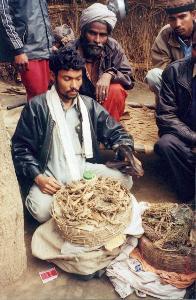Rachel Kaleta
Other projects
14 Aug 2002
Sustainability of Wild Harvesting of Thyme in the High Atlas Mountains in Morocco.
The aim of the project is to set up by the Wildlife Trust of India to study the Jogi-Nath snake charming communities in North India

Young snake charmer with his Cobra and medicinal plants.
As the result of the increasing conflict between conservationists and snake charmers, a project was set up by the Wildlife Trust of India to study the Jogi-Nath snake charming communities in North India. The projects’ aim was to study the existing livelihood strategies of the Jogi Nath and the impact of the Wildlife Protection Act on their way of life.
The Jogi-Nath snake charmers of northern India are renowned for their performances with wild snakes. The possession of wild snakes is illegal, but Jogi-Naths have no other livelihood alternatives. However, the Jogi-Nath also sell herbal medicines, lucky stones and amulets during their performances. For this reason, Rufford funding was acquired to enable an ethnobotanical study to determine the importance of medicinal healing to the Jogi-Nath.
The aim of my research project was therefore to investigate the socio-cultural significance of medicinal healing amongst snake charmers. This project was carried out as part of a larger project led by Bahar Dutt of the Wildlife Trust of India on snake charmer livelihoods in North India.